Analysis: COVID-19 Impact on UK Economy and Government Response
VerifiedAdded on 2023/06/08
|10
|2648
|344
Report
AI Summary
This report meticulously examines the multifaceted impacts of the COVID-19 pandemic on the UK economy. It details the severe economic consequences, including a significant GDP decline, widespread business closures, disrupted global supply chains, rising inflation, and substantial job losses. The report further analyzes the UK government's comprehensive response, outlining key policies and measures implemented by both the government and the Central Bank to mitigate the economic fallout. These measures include vaccination programs, financial support for businesses and individuals, adjustments to bank rates, quantitative easing, and various fiscal interventions designed to stabilize the economy and foster recovery. The report also discusses the impact on various sectors, including tourism, retail, manufacturing, and education, providing a holistic view of the pandemic's wide-ranging effects and the strategies employed to navigate the crisis. This analysis provides a comprehensive understanding of the challenges and responses during this unprecedented period.
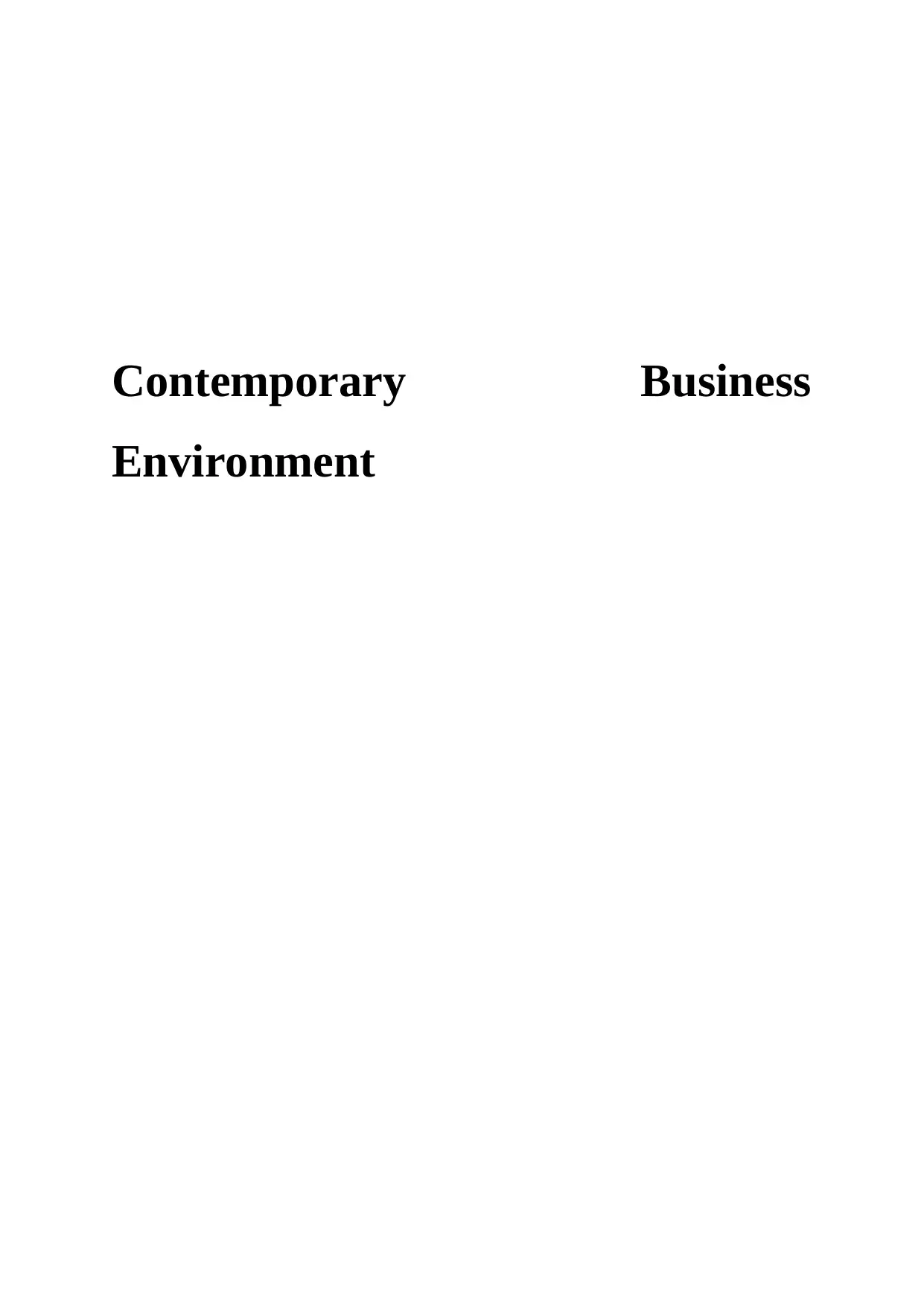
Contemporary Business
Environment
Environment
Paraphrase This Document
Need a fresh take? Get an instant paraphrase of this document with our AI Paraphraser
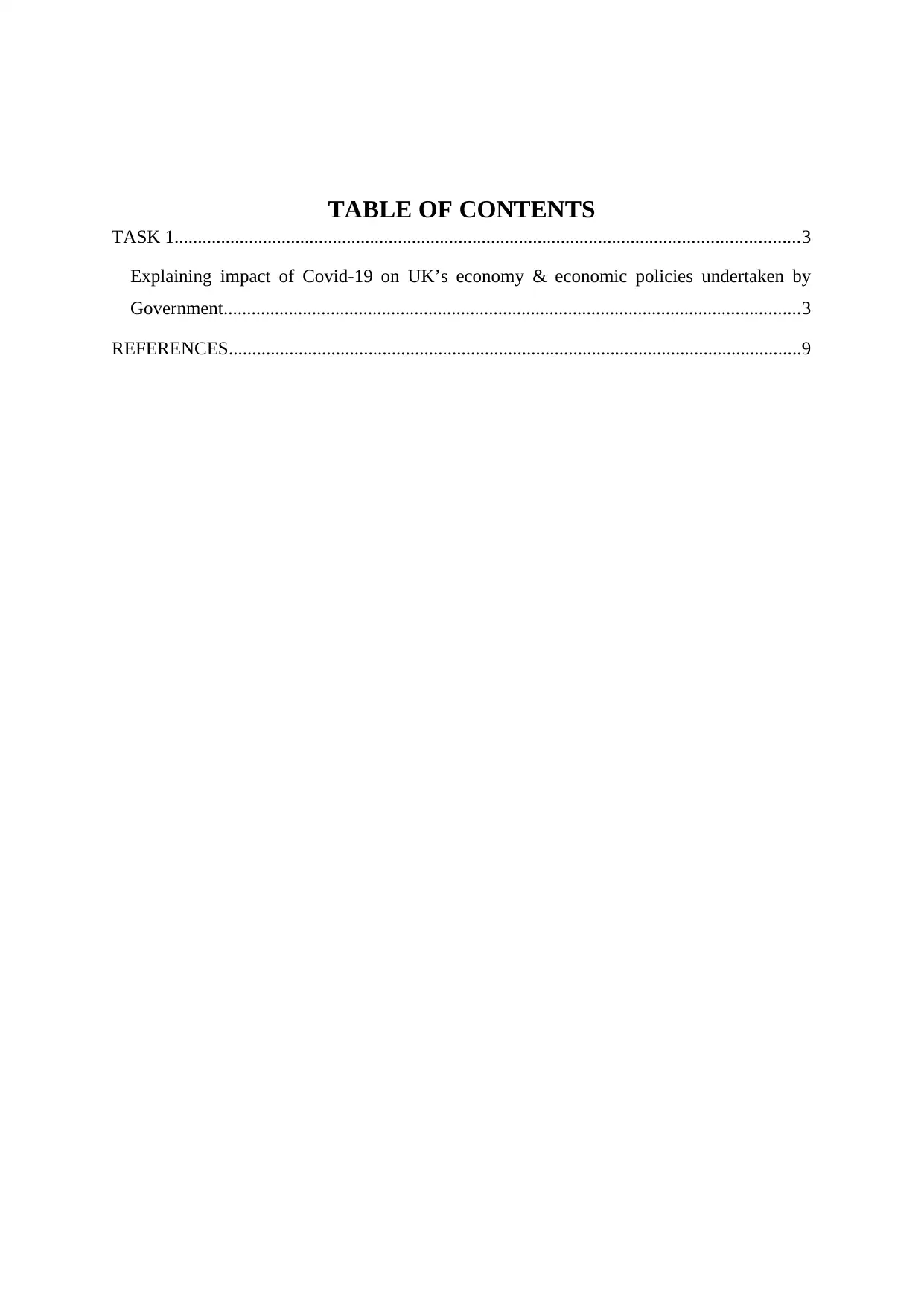
TABLE OF CONTENTS
TASK 1......................................................................................................................................3
Explaining impact of Covid-19 on UK’s economy & economic policies undertaken by
Government............................................................................................................................3
REFERENCES...........................................................................................................................9
TASK 1......................................................................................................................................3
Explaining impact of Covid-19 on UK’s economy & economic policies undertaken by
Government............................................................................................................................3
REFERENCES...........................................................................................................................9
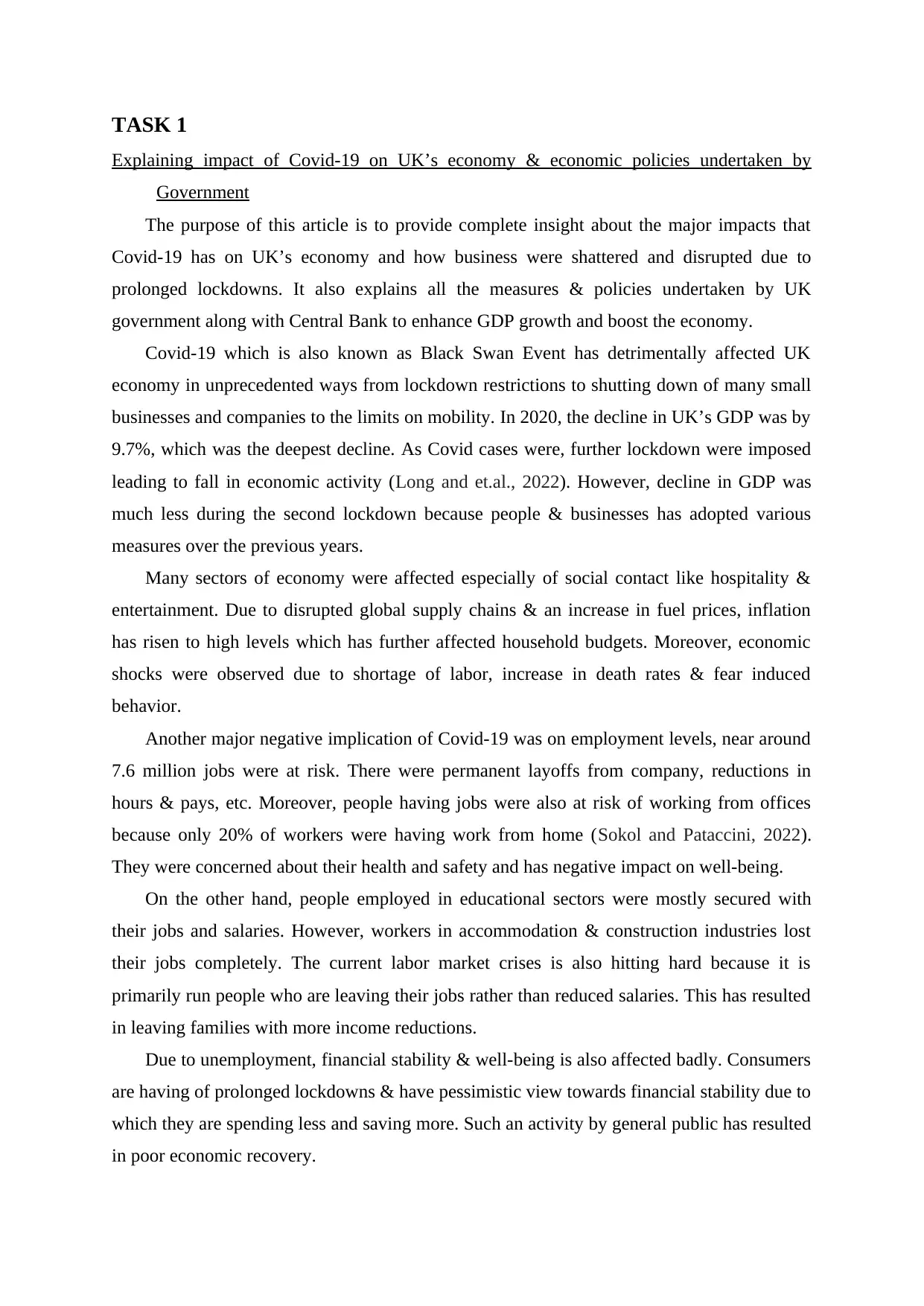
TASK 1
Explaining impact of Covid-19 on UK’s economy & economic policies undertaken by
Government
The purpose of this article is to provide complete insight about the major impacts that
Covid-19 has on UK’s economy and how business were shattered and disrupted due to
prolonged lockdowns. It also explains all the measures & policies undertaken by UK
government along with Central Bank to enhance GDP growth and boost the economy.
Covid-19 which is also known as Black Swan Event has detrimentally affected UK
economy in unprecedented ways from lockdown restrictions to shutting down of many small
businesses and companies to the limits on mobility. In 2020, the decline in UK’s GDP was by
9.7%, which was the deepest decline. As Covid cases were, further lockdown were imposed
leading to fall in economic activity (Long and et.al., 2022). However, decline in GDP was
much less during the second lockdown because people & businesses has adopted various
measures over the previous years.
Many sectors of economy were affected especially of social contact like hospitality &
entertainment. Due to disrupted global supply chains & an increase in fuel prices, inflation
has risen to high levels which has further affected household budgets. Moreover, economic
shocks were observed due to shortage of labor, increase in death rates & fear induced
behavior.
Another major negative implication of Covid-19 was on employment levels, near around
7.6 million jobs were at risk. There were permanent layoffs from company, reductions in
hours & pays, etc. Moreover, people having jobs were also at risk of working from offices
because only 20% of workers were having work from home (Sokol and Pataccini, 2022).
They were concerned about their health and safety and has negative impact on well-being.
On the other hand, people employed in educational sectors were mostly secured with
their jobs and salaries. However, workers in accommodation & construction industries lost
their jobs completely. The current labor market crises is also hitting hard because it is
primarily run people who are leaving their jobs rather than reduced salaries. This has resulted
in leaving families with more income reductions.
Due to unemployment, financial stability & well-being is also affected badly. Consumers
are having of prolonged lockdowns & have pessimistic view towards financial stability due to
which they are spending less and saving more. Such an activity by general public has resulted
in poor economic recovery.
Explaining impact of Covid-19 on UK’s economy & economic policies undertaken by
Government
The purpose of this article is to provide complete insight about the major impacts that
Covid-19 has on UK’s economy and how business were shattered and disrupted due to
prolonged lockdowns. It also explains all the measures & policies undertaken by UK
government along with Central Bank to enhance GDP growth and boost the economy.
Covid-19 which is also known as Black Swan Event has detrimentally affected UK
economy in unprecedented ways from lockdown restrictions to shutting down of many small
businesses and companies to the limits on mobility. In 2020, the decline in UK’s GDP was by
9.7%, which was the deepest decline. As Covid cases were, further lockdown were imposed
leading to fall in economic activity (Long and et.al., 2022). However, decline in GDP was
much less during the second lockdown because people & businesses has adopted various
measures over the previous years.
Many sectors of economy were affected especially of social contact like hospitality &
entertainment. Due to disrupted global supply chains & an increase in fuel prices, inflation
has risen to high levels which has further affected household budgets. Moreover, economic
shocks were observed due to shortage of labor, increase in death rates & fear induced
behavior.
Another major negative implication of Covid-19 was on employment levels, near around
7.6 million jobs were at risk. There were permanent layoffs from company, reductions in
hours & pays, etc. Moreover, people having jobs were also at risk of working from offices
because only 20% of workers were having work from home (Sokol and Pataccini, 2022).
They were concerned about their health and safety and has negative impact on well-being.
On the other hand, people employed in educational sectors were mostly secured with
their jobs and salaries. However, workers in accommodation & construction industries lost
their jobs completely. The current labor market crises is also hitting hard because it is
primarily run people who are leaving their jobs rather than reduced salaries. This has resulted
in leaving families with more income reductions.
Due to unemployment, financial stability & well-being is also affected badly. Consumers
are having of prolonged lockdowns & have pessimistic view towards financial stability due to
which they are spending less and saving more. Such an activity by general public has resulted
in poor economic recovery.
⊘ This is a preview!⊘
Do you want full access?
Subscribe today to unlock all pages.

Trusted by 1+ million students worldwide
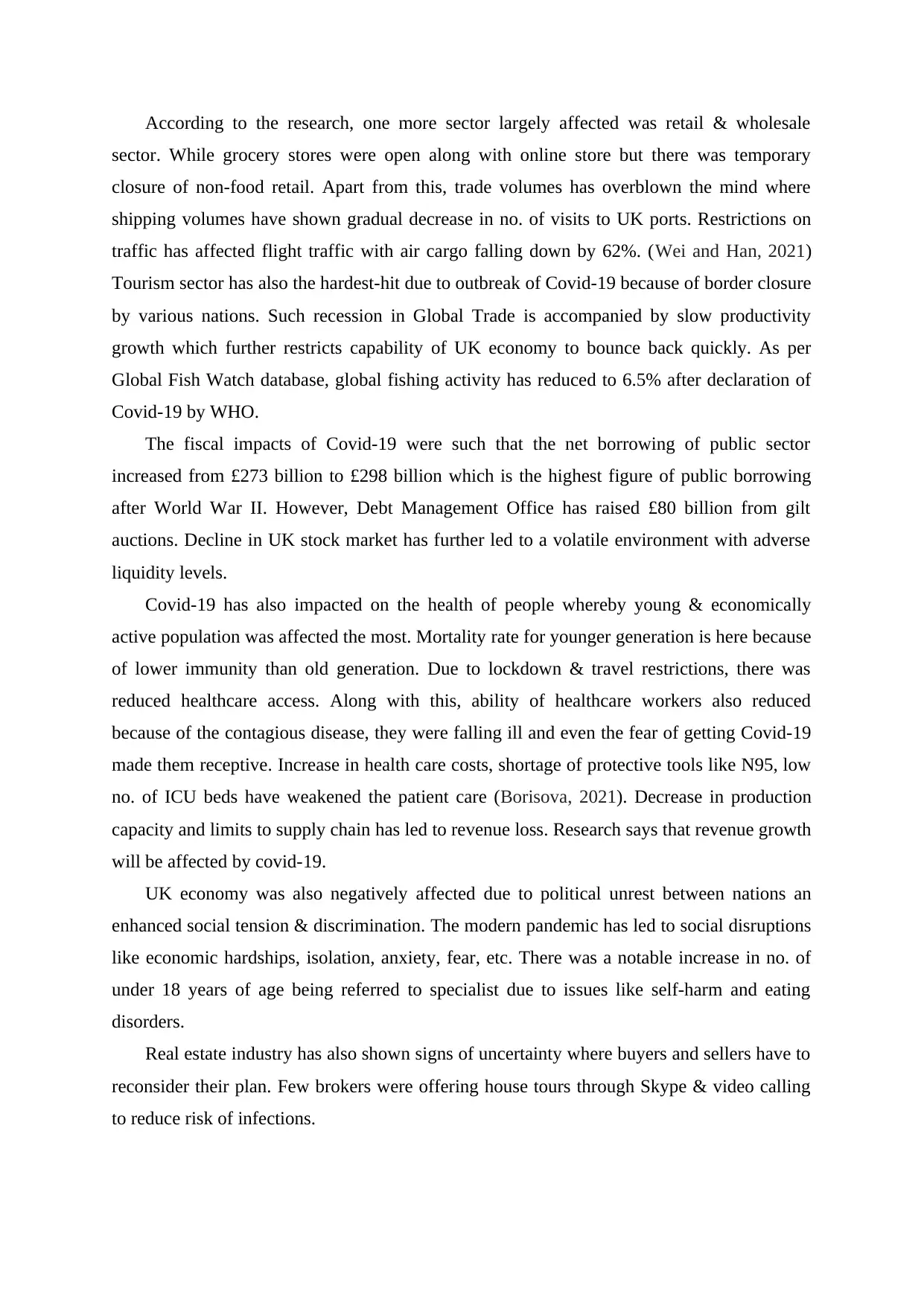
According to the research, one more sector largely affected was retail & wholesale
sector. While grocery stores were open along with online store but there was temporary
closure of non-food retail. Apart from this, trade volumes has overblown the mind where
shipping volumes have shown gradual decrease in no. of visits to UK ports. Restrictions on
traffic has affected flight traffic with air cargo falling down by 62%. (Wei and Han, 2021)
Tourism sector has also the hardest-hit due to outbreak of Covid-19 because of border closure
by various nations. Such recession in Global Trade is accompanied by slow productivity
growth which further restricts capability of UK economy to bounce back quickly. As per
Global Fish Watch database, global fishing activity has reduced to 6.5% after declaration of
Covid-19 by WHO.
The fiscal impacts of Covid-19 were such that the net borrowing of public sector
increased from £273 billion to £298 billion which is the highest figure of public borrowing
after World War II. However, Debt Management Office has raised £80 billion from gilt
auctions. Decline in UK stock market has further led to a volatile environment with adverse
liquidity levels.
Covid-19 has also impacted on the health of people whereby young & economically
active population was affected the most. Mortality rate for younger generation is here because
of lower immunity than old generation. Due to lockdown & travel restrictions, there was
reduced healthcare access. Along with this, ability of healthcare workers also reduced
because of the contagious disease, they were falling ill and even the fear of getting Covid-19
made them receptive. Increase in health care costs, shortage of protective tools like N95, low
no. of ICU beds have weakened the patient care (Borisova, 2021). Decrease in production
capacity and limits to supply chain has led to revenue loss. Research says that revenue growth
will be affected by covid-19.
UK economy was also negatively affected due to political unrest between nations an
enhanced social tension & discrimination. The modern pandemic has led to social disruptions
like economic hardships, isolation, anxiety, fear, etc. There was a notable increase in no. of
under 18 years of age being referred to specialist due to issues like self-harm and eating
disorders.
Real estate industry has also shown signs of uncertainty where buyers and sellers have to
reconsider their plan. Few brokers were offering house tours through Skype & video calling
to reduce risk of infections.
sector. While grocery stores were open along with online store but there was temporary
closure of non-food retail. Apart from this, trade volumes has overblown the mind where
shipping volumes have shown gradual decrease in no. of visits to UK ports. Restrictions on
traffic has affected flight traffic with air cargo falling down by 62%. (Wei and Han, 2021)
Tourism sector has also the hardest-hit due to outbreak of Covid-19 because of border closure
by various nations. Such recession in Global Trade is accompanied by slow productivity
growth which further restricts capability of UK economy to bounce back quickly. As per
Global Fish Watch database, global fishing activity has reduced to 6.5% after declaration of
Covid-19 by WHO.
The fiscal impacts of Covid-19 were such that the net borrowing of public sector
increased from £273 billion to £298 billion which is the highest figure of public borrowing
after World War II. However, Debt Management Office has raised £80 billion from gilt
auctions. Decline in UK stock market has further led to a volatile environment with adverse
liquidity levels.
Covid-19 has also impacted on the health of people whereby young & economically
active population was affected the most. Mortality rate for younger generation is here because
of lower immunity than old generation. Due to lockdown & travel restrictions, there was
reduced healthcare access. Along with this, ability of healthcare workers also reduced
because of the contagious disease, they were falling ill and even the fear of getting Covid-19
made them receptive. Increase in health care costs, shortage of protective tools like N95, low
no. of ICU beds have weakened the patient care (Borisova, 2021). Decrease in production
capacity and limits to supply chain has led to revenue loss. Research says that revenue growth
will be affected by covid-19.
UK economy was also negatively affected due to political unrest between nations an
enhanced social tension & discrimination. The modern pandemic has led to social disruptions
like economic hardships, isolation, anxiety, fear, etc. There was a notable increase in no. of
under 18 years of age being referred to specialist due to issues like self-harm and eating
disorders.
Real estate industry has also shown signs of uncertainty where buyers and sellers have to
reconsider their plan. Few brokers were offering house tours through Skype & video calling
to reduce risk of infections.
Paraphrase This Document
Need a fresh take? Get an instant paraphrase of this document with our AI Paraphraser
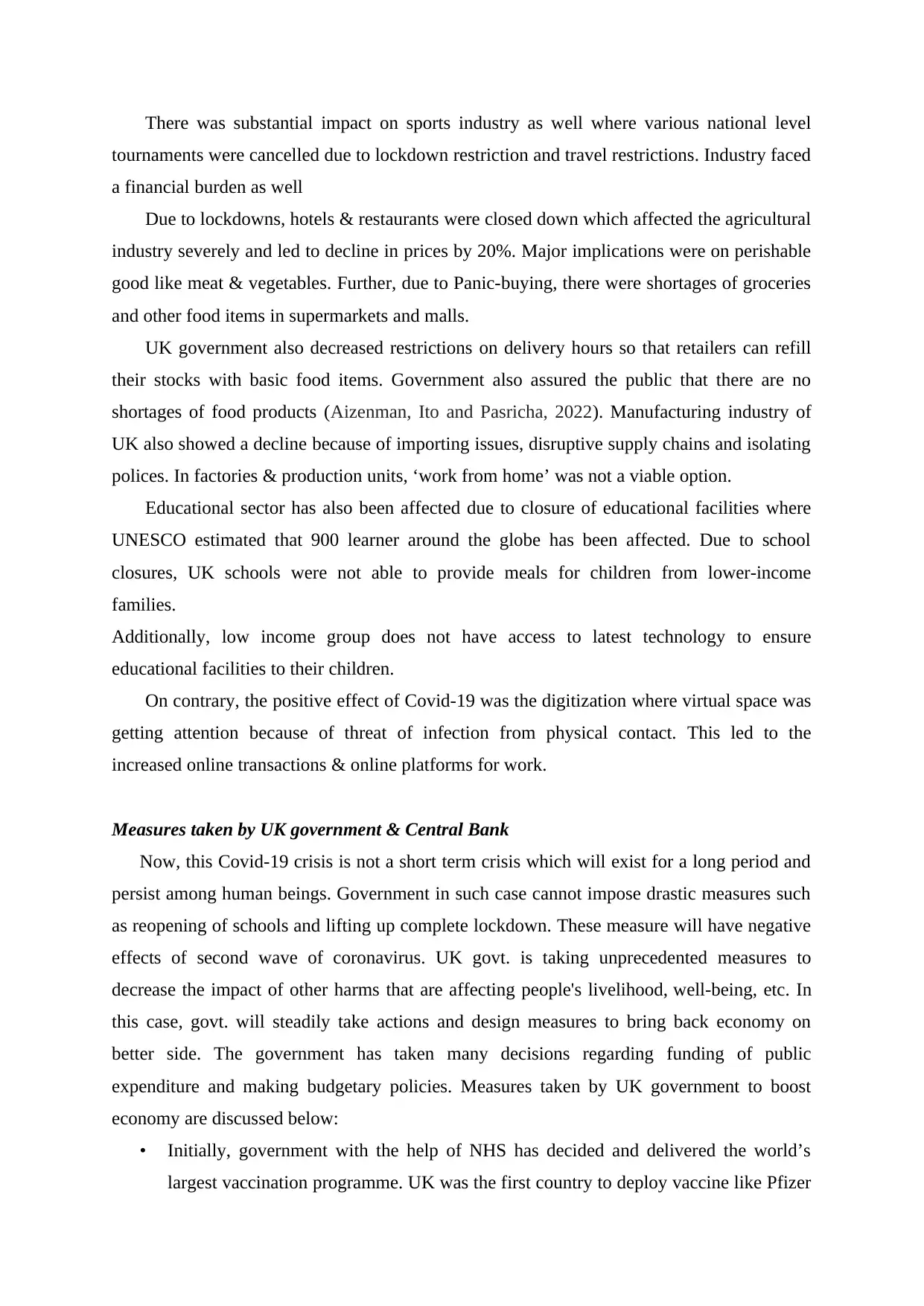
There was substantial impact on sports industry as well where various national level
tournaments were cancelled due to lockdown restriction and travel restrictions. Industry faced
a financial burden as well
Due to lockdowns, hotels & restaurants were closed down which affected the agricultural
industry severely and led to decline in prices by 20%. Major implications were on perishable
good like meat & vegetables. Further, due to Panic-buying, there were shortages of groceries
and other food items in supermarkets and malls.
UK government also decreased restrictions on delivery hours so that retailers can refill
their stocks with basic food items. Government also assured the public that there are no
shortages of food products (Aizenman, Ito and Pasricha, 2022). Manufacturing industry of
UK also showed a decline because of importing issues, disruptive supply chains and isolating
polices. In factories & production units, ‘work from home’ was not a viable option.
Educational sector has also been affected due to closure of educational facilities where
UNESCO estimated that 900 learner around the globe has been affected. Due to school
closures, UK schools were not able to provide meals for children from lower-income
families.
Additionally, low income group does not have access to latest technology to ensure
educational facilities to their children.
On contrary, the positive effect of Covid-19 was the digitization where virtual space was
getting attention because of threat of infection from physical contact. This led to the
increased online transactions & online platforms for work.
Measures taken by UK government & Central Bank
Now, this Covid-19 crisis is not a short term crisis which will exist for a long period and
persist among human beings. Government in such case cannot impose drastic measures such
as reopening of schools and lifting up complete lockdown. These measure will have negative
effects of second wave of coronavirus. UK govt. is taking unprecedented measures to
decrease the impact of other harms that are affecting people's livelihood, well-being, etc. In
this case, govt. will steadily take actions and design measures to bring back economy on
better side. The government has taken many decisions regarding funding of public
expenditure and making budgetary policies. Measures taken by UK government to boost
economy are discussed below:
• Initially, government with the help of NHS has decided and delivered the world’s
largest vaccination programme. UK was the first country to deploy vaccine like Pfizer
tournaments were cancelled due to lockdown restriction and travel restrictions. Industry faced
a financial burden as well
Due to lockdowns, hotels & restaurants were closed down which affected the agricultural
industry severely and led to decline in prices by 20%. Major implications were on perishable
good like meat & vegetables. Further, due to Panic-buying, there were shortages of groceries
and other food items in supermarkets and malls.
UK government also decreased restrictions on delivery hours so that retailers can refill
their stocks with basic food items. Government also assured the public that there are no
shortages of food products (Aizenman, Ito and Pasricha, 2022). Manufacturing industry of
UK also showed a decline because of importing issues, disruptive supply chains and isolating
polices. In factories & production units, ‘work from home’ was not a viable option.
Educational sector has also been affected due to closure of educational facilities where
UNESCO estimated that 900 learner around the globe has been affected. Due to school
closures, UK schools were not able to provide meals for children from lower-income
families.
Additionally, low income group does not have access to latest technology to ensure
educational facilities to their children.
On contrary, the positive effect of Covid-19 was the digitization where virtual space was
getting attention because of threat of infection from physical contact. This led to the
increased online transactions & online platforms for work.
Measures taken by UK government & Central Bank
Now, this Covid-19 crisis is not a short term crisis which will exist for a long period and
persist among human beings. Government in such case cannot impose drastic measures such
as reopening of schools and lifting up complete lockdown. These measure will have negative
effects of second wave of coronavirus. UK govt. is taking unprecedented measures to
decrease the impact of other harms that are affecting people's livelihood, well-being, etc. In
this case, govt. will steadily take actions and design measures to bring back economy on
better side. The government has taken many decisions regarding funding of public
expenditure and making budgetary policies. Measures taken by UK government to boost
economy are discussed below:
• Initially, government with the help of NHS has decided and delivered the world’s
largest vaccination programme. UK was the first country to deploy vaccine like Pfizer
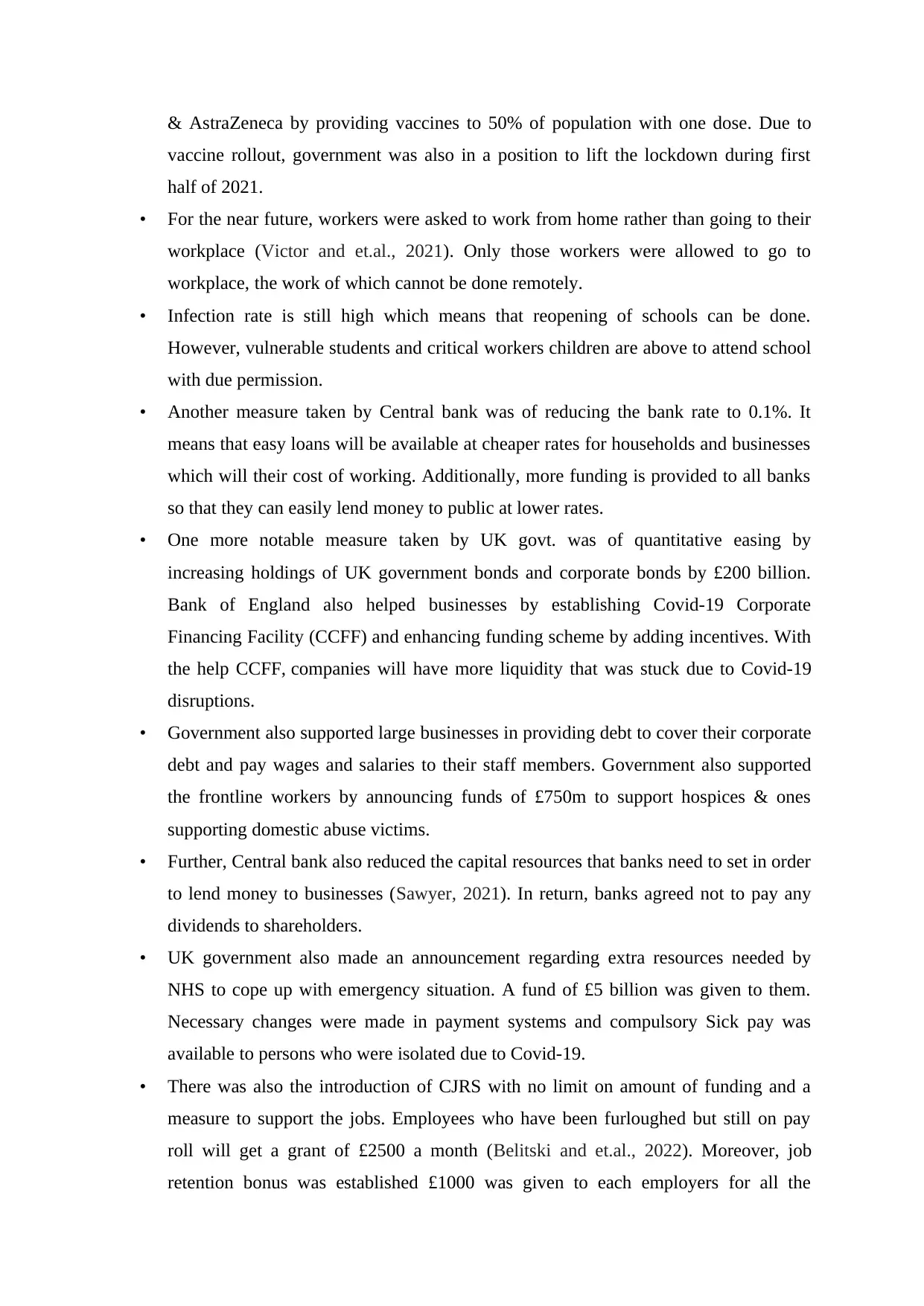
& AstraZeneca by providing vaccines to 50% of population with one dose. Due to
vaccine rollout, government was also in a position to lift the lockdown during first
half of 2021.
• For the near future, workers were asked to work from home rather than going to their
workplace (Victor and et.al., 2021). Only those workers were allowed to go to
workplace, the work of which cannot be done remotely.
• Infection rate is still high which means that reopening of schools can be done.
However, vulnerable students and critical workers children are above to attend school
with due permission.
• Another measure taken by Central bank was of reducing the bank rate to 0.1%. It
means that easy loans will be available at cheaper rates for households and businesses
which will their cost of working. Additionally, more funding is provided to all banks
so that they can easily lend money to public at lower rates.
• One more notable measure taken by UK govt. was of quantitative easing by
increasing holdings of UK government bonds and corporate bonds by £200 billion.
Bank of England also helped businesses by establishing Covid-19 Corporate
Financing Facility (CCFF) and enhancing funding scheme by adding incentives. With
the help CCFF, companies will have more liquidity that was stuck due to Covid-19
disruptions.
• Government also supported large businesses in providing debt to cover their corporate
debt and pay wages and salaries to their staff members. Government also supported
the frontline workers by announcing funds of £750m to support hospices & ones
supporting domestic abuse victims.
• Further, Central bank also reduced the capital resources that banks need to set in order
to lend money to businesses (Sawyer, 2021). In return, banks agreed not to pay any
dividends to shareholders.
• UK government also made an announcement regarding extra resources needed by
NHS to cope up with emergency situation. A fund of £5 billion was given to them.
Necessary changes were made in payment systems and compulsory Sick pay was
available to persons who were isolated due to Covid-19.
• There was also the introduction of CJRS with no limit on amount of funding and a
measure to support the jobs. Employees who have been furloughed but still on pay
roll will get a grant of £2500 a month (Belitski and et.al., 2022). Moreover, job
retention bonus was established £1000 was given to each employers for all the
vaccine rollout, government was also in a position to lift the lockdown during first
half of 2021.
• For the near future, workers were asked to work from home rather than going to their
workplace (Victor and et.al., 2021). Only those workers were allowed to go to
workplace, the work of which cannot be done remotely.
• Infection rate is still high which means that reopening of schools can be done.
However, vulnerable students and critical workers children are above to attend school
with due permission.
• Another measure taken by Central bank was of reducing the bank rate to 0.1%. It
means that easy loans will be available at cheaper rates for households and businesses
which will their cost of working. Additionally, more funding is provided to all banks
so that they can easily lend money to public at lower rates.
• One more notable measure taken by UK govt. was of quantitative easing by
increasing holdings of UK government bonds and corporate bonds by £200 billion.
Bank of England also helped businesses by establishing Covid-19 Corporate
Financing Facility (CCFF) and enhancing funding scheme by adding incentives. With
the help CCFF, companies will have more liquidity that was stuck due to Covid-19
disruptions.
• Government also supported large businesses in providing debt to cover their corporate
debt and pay wages and salaries to their staff members. Government also supported
the frontline workers by announcing funds of £750m to support hospices & ones
supporting domestic abuse victims.
• Further, Central bank also reduced the capital resources that banks need to set in order
to lend money to businesses (Sawyer, 2021). In return, banks agreed not to pay any
dividends to shareholders.
• UK government also made an announcement regarding extra resources needed by
NHS to cope up with emergency situation. A fund of £5 billion was given to them.
Necessary changes were made in payment systems and compulsory Sick pay was
available to persons who were isolated due to Covid-19.
• There was also the introduction of CJRS with no limit on amount of funding and a
measure to support the jobs. Employees who have been furloughed but still on pay
roll will get a grant of £2500 a month (Belitski and et.al., 2022). Moreover, job
retention bonus was established £1000 was given to each employers for all the
⊘ This is a preview!⊘
Do you want full access?
Subscribe today to unlock all pages.

Trusted by 1+ million students worldwide
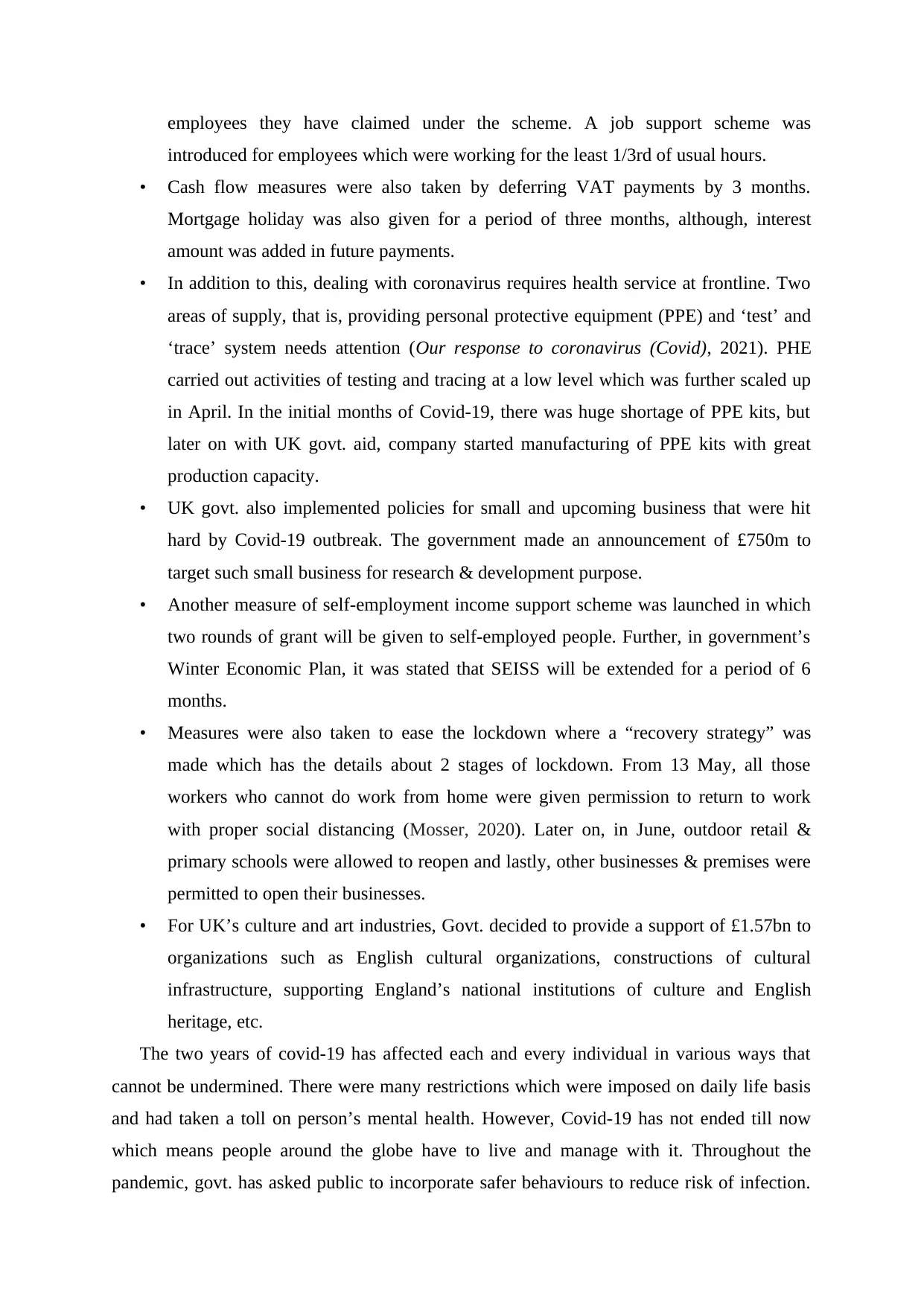
employees they have claimed under the scheme. A job support scheme was
introduced for employees which were working for the least 1/3rd of usual hours.
• Cash flow measures were also taken by deferring VAT payments by 3 months.
Mortgage holiday was also given for a period of three months, although, interest
amount was added in future payments.
• In addition to this, dealing with coronavirus requires health service at frontline. Two
areas of supply, that is, providing personal protective equipment (PPE) and ‘test’ and
‘trace’ system needs attention (Our response to coronavirus (Covid), 2021). PHE
carried out activities of testing and tracing at a low level which was further scaled up
in April. In the initial months of Covid-19, there was huge shortage of PPE kits, but
later on with UK govt. aid, company started manufacturing of PPE kits with great
production capacity.
• UK govt. also implemented policies for small and upcoming business that were hit
hard by Covid-19 outbreak. The government made an announcement of £750m to
target such small business for research & development purpose.
• Another measure of self-employment income support scheme was launched in which
two rounds of grant will be given to self-employed people. Further, in government’s
Winter Economic Plan, it was stated that SEISS will be extended for a period of 6
months.
• Measures were also taken to ease the lockdown where a “recovery strategy” was
made which has the details about 2 stages of lockdown. From 13 May, all those
workers who cannot do work from home were given permission to return to work
with proper social distancing (Mosser, 2020). Later on, in June, outdoor retail &
primary schools were allowed to reopen and lastly, other businesses & premises were
permitted to open their businesses.
• For UK’s culture and art industries, Govt. decided to provide a support of £1.57bn to
organizations such as English cultural organizations, constructions of cultural
infrastructure, supporting England’s national institutions of culture and English
heritage, etc.
The two years of covid-19 has affected each and every individual in various ways that
cannot be undermined. There were many restrictions which were imposed on daily life basis
and had taken a toll on person’s mental health. However, Covid-19 has not ended till now
which means people around the globe have to live and manage with it. Throughout the
pandemic, govt. has asked public to incorporate safer behaviours to reduce risk of infection.
introduced for employees which were working for the least 1/3rd of usual hours.
• Cash flow measures were also taken by deferring VAT payments by 3 months.
Mortgage holiday was also given for a period of three months, although, interest
amount was added in future payments.
• In addition to this, dealing with coronavirus requires health service at frontline. Two
areas of supply, that is, providing personal protective equipment (PPE) and ‘test’ and
‘trace’ system needs attention (Our response to coronavirus (Covid), 2021). PHE
carried out activities of testing and tracing at a low level which was further scaled up
in April. In the initial months of Covid-19, there was huge shortage of PPE kits, but
later on with UK govt. aid, company started manufacturing of PPE kits with great
production capacity.
• UK govt. also implemented policies for small and upcoming business that were hit
hard by Covid-19 outbreak. The government made an announcement of £750m to
target such small business for research & development purpose.
• Another measure of self-employment income support scheme was launched in which
two rounds of grant will be given to self-employed people. Further, in government’s
Winter Economic Plan, it was stated that SEISS will be extended for a period of 6
months.
• Measures were also taken to ease the lockdown where a “recovery strategy” was
made which has the details about 2 stages of lockdown. From 13 May, all those
workers who cannot do work from home were given permission to return to work
with proper social distancing (Mosser, 2020). Later on, in June, outdoor retail &
primary schools were allowed to reopen and lastly, other businesses & premises were
permitted to open their businesses.
• For UK’s culture and art industries, Govt. decided to provide a support of £1.57bn to
organizations such as English cultural organizations, constructions of cultural
infrastructure, supporting England’s national institutions of culture and English
heritage, etc.
The two years of covid-19 has affected each and every individual in various ways that
cannot be undermined. There were many restrictions which were imposed on daily life basis
and had taken a toll on person’s mental health. However, Covid-19 has not ended till now
which means people around the globe have to live and manage with it. Throughout the
pandemic, govt. has asked public to incorporate safer behaviours to reduce risk of infection.
Paraphrase This Document
Need a fresh take? Get an instant paraphrase of this document with our AI Paraphraser

They advised general public to take necessary precautions to reduce effects of such deadly
disease. Government is trying to do its best to revive the economy by ploughing all resources
possible.
•
disease. Government is trying to do its best to revive the economy by ploughing all resources
possible.
•
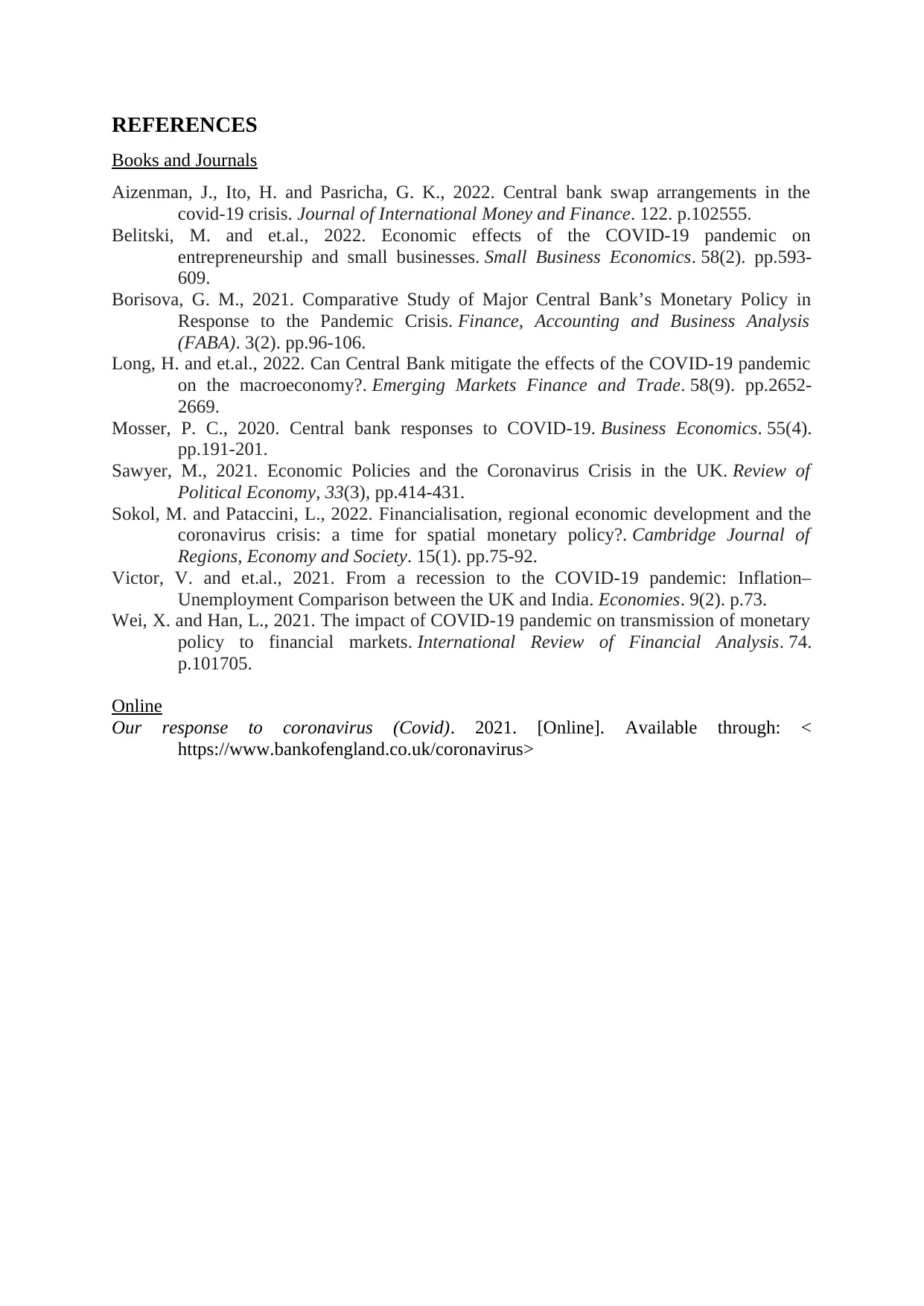
REFERENCES
Books and Journals
Aizenman, J., Ito, H. and Pasricha, G. K., 2022. Central bank swap arrangements in the
covid-19 crisis. Journal of International Money and Finance. 122. p.102555.
Belitski, M. and et.al., 2022. Economic effects of the COVID-19 pandemic on
entrepreneurship and small businesses. Small Business Economics. 58(2). pp.593-
609.
Borisova, G. M., 2021. Comparative Study of Major Central Bank’s Monetary Policy in
Response to the Pandemic Crisis. Finance, Accounting and Business Analysis
(FABA). 3(2). pp.96-106.
Long, H. and et.al., 2022. Can Central Bank mitigate the effects of the COVID-19 pandemic
on the macroeconomy?. Emerging Markets Finance and Trade. 58(9). pp.2652-
2669.
Mosser, P. C., 2020. Central bank responses to COVID-19. Business Economics. 55(4).
pp.191-201.
Sawyer, M., 2021. Economic Policies and the Coronavirus Crisis in the UK. Review of
Political Economy, 33(3), pp.414-431.
Sokol, M. and Pataccini, L., 2022. Financialisation, regional economic development and the
coronavirus crisis: a time for spatial monetary policy?. Cambridge Journal of
Regions, Economy and Society. 15(1). pp.75-92.
Victor, V. and et.al., 2021. From a recession to the COVID-19 pandemic: Inflation–
Unemployment Comparison between the UK and India. Economies. 9(2). p.73.
Wei, X. and Han, L., 2021. The impact of COVID-19 pandemic on transmission of monetary
policy to financial markets. International Review of Financial Analysis. 74.
p.101705.
Online
Our response to coronavirus (Covid). 2021. [Online]. Available through: <
https://www.bankofengland.co.uk/coronavirus>
Books and Journals
Aizenman, J., Ito, H. and Pasricha, G. K., 2022. Central bank swap arrangements in the
covid-19 crisis. Journal of International Money and Finance. 122. p.102555.
Belitski, M. and et.al., 2022. Economic effects of the COVID-19 pandemic on
entrepreneurship and small businesses. Small Business Economics. 58(2). pp.593-
609.
Borisova, G. M., 2021. Comparative Study of Major Central Bank’s Monetary Policy in
Response to the Pandemic Crisis. Finance, Accounting and Business Analysis
(FABA). 3(2). pp.96-106.
Long, H. and et.al., 2022. Can Central Bank mitigate the effects of the COVID-19 pandemic
on the macroeconomy?. Emerging Markets Finance and Trade. 58(9). pp.2652-
2669.
Mosser, P. C., 2020. Central bank responses to COVID-19. Business Economics. 55(4).
pp.191-201.
Sawyer, M., 2021. Economic Policies and the Coronavirus Crisis in the UK. Review of
Political Economy, 33(3), pp.414-431.
Sokol, M. and Pataccini, L., 2022. Financialisation, regional economic development and the
coronavirus crisis: a time for spatial monetary policy?. Cambridge Journal of
Regions, Economy and Society. 15(1). pp.75-92.
Victor, V. and et.al., 2021. From a recession to the COVID-19 pandemic: Inflation–
Unemployment Comparison between the UK and India. Economies. 9(2). p.73.
Wei, X. and Han, L., 2021. The impact of COVID-19 pandemic on transmission of monetary
policy to financial markets. International Review of Financial Analysis. 74.
p.101705.
Online
Our response to coronavirus (Covid). 2021. [Online]. Available through: <
https://www.bankofengland.co.uk/coronavirus>
⊘ This is a preview!⊘
Do you want full access?
Subscribe today to unlock all pages.

Trusted by 1+ million students worldwide

1 out of 10
Related Documents
Your All-in-One AI-Powered Toolkit for Academic Success.
+13062052269
info@desklib.com
Available 24*7 on WhatsApp / Email
![[object Object]](/_next/static/media/star-bottom.7253800d.svg)
Unlock your academic potential
Copyright © 2020–2026 A2Z Services. All Rights Reserved. Developed and managed by ZUCOL.




